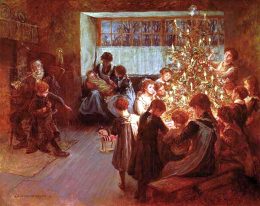All I want for Christmas is for white men to be happy. Yes, you read that correctly. I want you, white man, to be happy this Christmas. Wherever you are and whoever you are with, I want you to be happy. What do I mean by this? Let’s find out!
I’ve had the opportunity to spend Christmas in various places in the world, including the USA, Japan, Norway, Germany, and Ukraine. I’ve spent Christmas with family, friends, girlfriends, and more often than not, all alone by myself. On this special day, I’ve seen friends get engaged, family members get into fights, and I’ve taken many walks alone.
Yet every single year, I’m always happy on Christmas. I have a lot of reasons for this, but the most important reason is that I’ve always been able to chat with my mom or receive an email from her. No matter where I was or who I was spending Christmas with, hearing from my mom always cheered me up and made me feel happy.
But what is happiness? Greater minds than mine have been contemplating this idea for thousands of years, and even they haven’t come up with a simple or straightforward answer. But my mom taught me a valuable lesson when I was a kid that has stuck with me till this very day. She explained to me that happiness isn’t always getting what you want, but appreciating what you’ve got, when you’ve got it, before it’s gone. Because, as she often explained, nothing lasts forever.
I will admit that this is easier said than done, especially since my mom has always put up with my extreme music, worldview, and personality. Many of our fellow brothers don’t have family members as understanding or supportive as mine. Many of our guys have lost friends and family members these last few years due to our views and concerns.
Nevertheless, I want all of you to take the time this Christmas and consider all the things you have, and try to be appreciative of them. Even if it means just being thankful for having a roof over your head, food in your stomach, clothes on your back, and your health. This isn’t to say you should ignore your problems or settle for mediocrity in your life. I just want you to realize the things you do have in your life, with the hope that this acknowledgement can make you happy, or at least cheer you up, on Christmas.
A few guys I know have told me they often get lonely during the holidays because they don’t have a girlfriend or can’t find a woman. To that, I usually respond, jokingly, by saying “no woman, no problem.” After mutual laughs, I try to explain to them that a woman can never make a man truly happy. Only a man can make himself happy, by doing the things that give their lives meaning and purpose. Being with the right woman might make you happier, but being with the wrong woman can definitely make you unhappy. So if you have a good woman in your life, take the time to appreciate her this Christmas. If you don’t have a woman, be happy you’re not with the wrong woman, and realize that you have the freedom to either search for a woman or simply focus on yourself.
If you find yourself alone without friends or family this Christmas, think about the things that make you happy, or at least hobbies that you enjoy. For me, the things that I enjoy most when I’m alone is listening to heavy metal, reading fantasy books, and playing role playing video games. When I’ve found myself alone (or with bad company) during the holidays, these activities definitely saved the day for me.
Or better yet, reach out to our guys and say hello and wish them a merry Christmas or good Yule. Even a simple text message or email might make their day. I know it may seem trivial or redundant, but trust me, it’s the thought that counts and our guys will definitely appreciate it.
Of all the places I’ve spent Christmas at, the best times and memories I’ve had were in Schneeberg, Germany. This is a small town in the Erzgebirge region of Saxony. I used to go there every Christmas to visit my heavy metal friends. We would eat and drink at various family member homes, where I definitely got my share of German food, beer, and TV holiday specials. More importantly, I got to spend time with people who treated me like family and accepted me for who I am. I felt happy because I felt that I was part of their family and community.
As time went on, my friends eventually got full-time jobs, relocated, or got married and had kids. I don’t see them as much, and I don’t get to visit Schneeberg as often as I’d like. Hence the importance of appreciating things when you can, as nothing lasts forever. Nevertheless, I always try to message them on Christmas and check in on them. I’m happy for them, and I’m happy for both the great times we had and when I get to hear from them on Christmas.
This year, I’m spending Christmas in Eger, Hungary. Eger is a small, but historic city that is known for its fortress that successfully withstood various sieges of the invading Ottoman Empire in the 16th century. There was even a famous historical novel about one of the sieges called Eclipse of the Crescent Moon, by Géza Gárdonyi.
This Christmas, I’m very thankful to the Hungarian people that risked their lives in defending Europe from foreign invaders. I’m also very happy that I can spend this Christmas visiting the fortress, eating Lángos, and drinking holiday wine while messaging my mom and friends around the world. I might also play some video games, read a chapter or two of Egri Csillagok (to practice my Hungarian), and listen to some classic metal albums (Fighting the World).
So whether you are spending the holiday with friends, family, or by yourself, I want you to be happy. I want you to appreciate what you have, while you still have it. And most of all, I want you to have a merry Christmas and good Yule. Glück auf.




